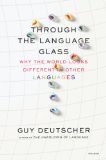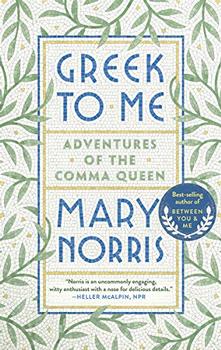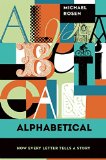Summary | Excerpt | Reviews | Beyond the book | Read-Alikes | Genres & Themes | Author Bio

Critics' Opinion:
Readers' Opinion:
First Published:
Aug 2010, 320 pages
Paperback:
Aug 2011, 320 pages
 Book Reviewed by:
Book Reviewed by:
Jo Perry
Buy This Book
How does our mother tongue (Why don't we call it a "father tongue," I wonder?) shape what we see and what we don't see; how we orient ourselves in space and time; and the associations we attach to people, animals, ideas and objects? Why do some people describe the sky as black, not blue? And what exactly did Homer mean when he said "wine-dark sea"? Through the Language Glass is Guy Deutscher's exuberant and very excellent adventure among competing ideas, theories and scientific experiments to find the answers.
Deutscher argues that "cultural differences are reflected in language in profound ways," creating "habits of mind that language can instill on the ground level of thought: on memory, attention, perception, and associations." Color perception (blue in particular) is the earthiest and most fascinating of these, something most of us would imagine is universal in all human beings, and the least susceptible to cultural influence.
Deutscher begins with Homer's "wine-dark sea" and Thomas Gladstone's analysis of Homer's use of color. Gladstone noted that Homer's sea and oxen are wine-colored; the sea, iron, and sheep in the Cyclops's cave are "violet"; and chloros (green) describes "faces pale with fear," fresh twigs and olive wood, and honey. Most strange, Gladstone observes that Homer's sky is "'starry... broad... great... iron... or copper; ... [but] never blue.'"
Gladstone concluded that ancient Greeks were blue-blind and literally saw the world in black and white and red - I thought right away of Grecian urns - with violet or wine being "shades of darkness," and chloros describing a particular paleness. Deutscher deftly maneuvers the reader among later studies of literature, color perception and expression (the Vedic poets never say "blue" either, while Biblical Hebrew didn't have a word for "blue") to demonstrate that there was nothing primitive in the way the Greeks' eyes saw things: "people can see the differences between all imaginable shades of colors and yet have no standard names in their language for basic colors such as green or blue."
Deutscher's stunning revelation is that despite what we feel and what we see, "'blue' is ultimately a cultural convention." Deutscher demonstrates that languages have color-names that don't exist for speakers of other tongues (Russian has "siniy and goluboy, a dark and a light blue absent from an English-speaker's perception or vocabulary"), and cautions that it should not seem strange that people who have "never seen an object with a color similar to the sky fail to find a special name for this great expanse of nothingness."
Deutscher then does for syntax, morphology, gender, complexity of vocabulary and spatial orientation what he did for color - he shows what has been hypothesized about language and what has been discovered to demonstrate just how language affects thought: "If different languages influence their speakers' minds in varying ways, this is not because of what each language allows people to think but rather because of the kinds of information each language habitually obliges people to think about."
I would have liked to see Deutscher examine the figurative language characteristic of particular languages, and to have learned how the various color dialects are expressed in visual art. But the ride he gives the reader here is exciting enough. Whether discussing the gender (or drab sexlessness if you speak English) of turnips, the exact degree of "pastness" a language does or doesn't discern, the shimmering brightness or darkness of an object, the color of the sky (if it even has a color), or our place in space (in front or behind, up or down, north or south), Deutscher, with a gift for wordplay and a joyful scholarliness, amazes the reader with the richness of linguistic variation and the refinement and inventiveness possible to human imagination and experience:
"No language - not even that of the most 'primitive' tribes - is inherently unsuitable for expressing the most complex ideas. Any shortcomings in a language's ability to philosophize simply boil down to the lack of some specialized abstract vocabulary and perhaps a few syntactic constructions, but these can easily be borrowed, just as all European languages pinched their verbal philosophical tool kit from Latin, which in turn lifted it wholesale from Greek…"
![]() This review was originally published in The BookBrowse Review in October 2010, and has been updated for the
September 2011 edition.
Click here to go to this issue.
This review was originally published in The BookBrowse Review in October 2010, and has been updated for the
September 2011 edition.
Click here to go to this issue.

If you liked Through the Language Glass, try these:

by Mary Norris
Published 2020
The Comma Queen returns with a buoyant book about language, love, and the wine-dark sea.

by Michael Rosen
Published 2016
Michael Rosen takes you on an unforgettable adventure through the history of the alphabet in twenty-six vivid chapters, fizzing with personal anecdotes and fascinating facts




Good as it is to inherit a library, it is better to collect one.
Click Here to find out who said this, as well as discovering other famous literary quotes!
Your guide toexceptional books
BookBrowse seeks out and recommends the best in contemporary fiction and nonfiction—books that not only engage and entertain but also deepen our understanding of ourselves and the world around us.